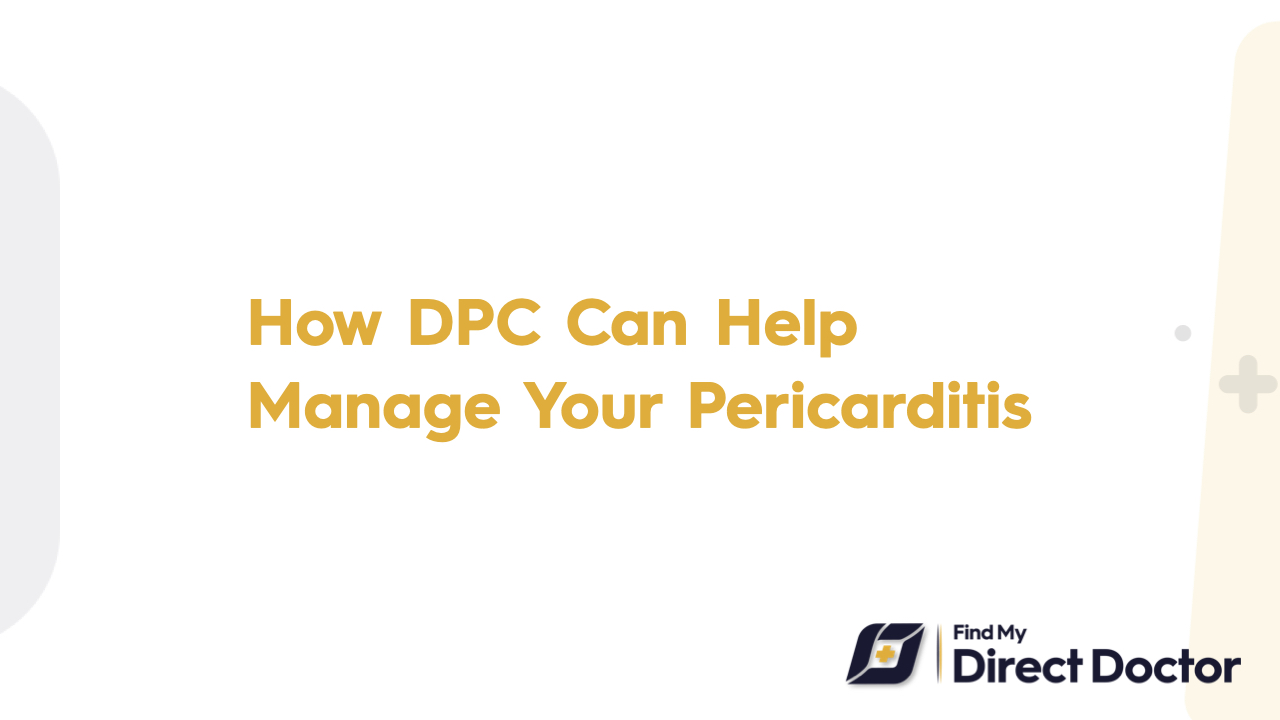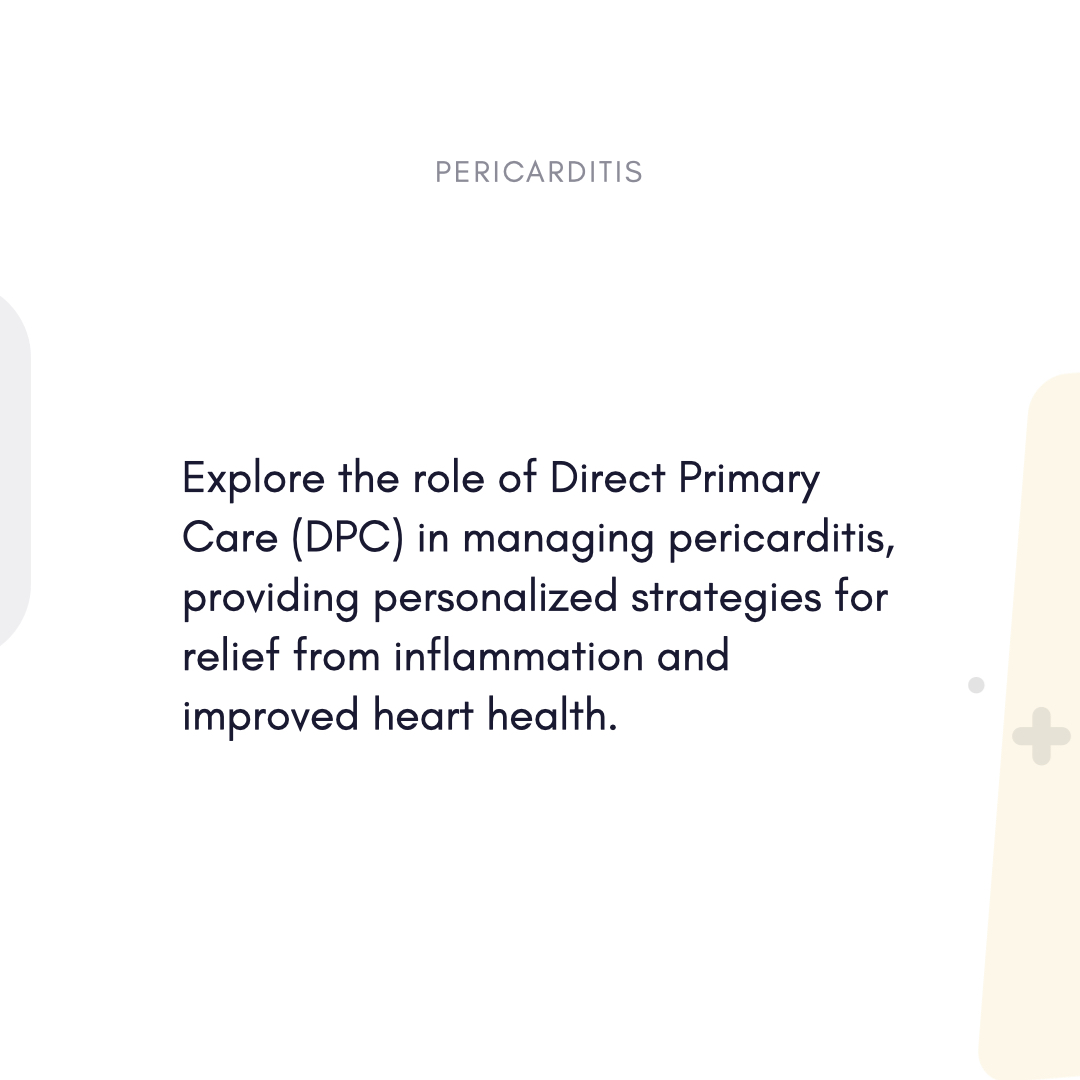Pericarditis and Direct Primary Care (DPC): Personalized Care to Ease Chest Pain and Prevent Complications
A keen, stabbing pain that gets worse when you lie down. For more than 60,000 Americans diagnosed with pericarditis every year, this inflammation of the heart's lining interferes with daily life and runs the danger of permanent heart damage. Many times, traditional care delays important treatments, leaving patients riding through ER visits. Direct Primary Care (DPC) offers timely, patient-centered treatment to quickly resolve flare-ups and stop long-term damage, so offering hope.

Knowledge of Pericarditis
The pericardium, the sac encircling the heart, is inflamed in pericarditis. Among the causes are viral infections, autoimmune diseases, or problems following heart surgery. Many times, symptoms resemble a heart attack.
- Sharp, worse chest discomfort either lying flat or during deep breaths.
- Temperature, tiredness, or dyspnea.
- Grating sound produced by pericardial rub (stethoscope)
Delayed care presents certain hazards.
- Recurrent pericarditis (between 20 and 30 percent of cases)
- Scarring causing constrictive pericarditis—that which compromises heart performance
- Cardiac tamponade, a potentially fatal fluid accumulation
Early anti-inflammatory treatment is stressed by the American Heart Association to stop progression.
DPC Changes Control of Pericarditis
Operating on a membership model usually 50–150 USD/month, Direct Primary Care (DPC) provides unlimited access to your physician for a set fee. For those with pericarditis, this means no prior authorizations, no co-pays, and a care plan as pressing as your discomfort.
1. Quick Diagnosis and Instant Relief
The easily available DPC model guarantees:
- Same-day chest pain or suspected flare evaluations.
- Affordable echocardiograms or chest X-rays will help to rule out tamponade in-office EKGs and imaging.
- Start NSAIDs (e.g., ibuprofen), colchicine, or corticosteroids within hours.
2. Tailored, Guideline-Driven Treatment
DPC doctors design customized programs compliant with cardiology best standards:
- Optimizing drugs: Changing colchicine amounts lowers recurrence risk.
- Tracking CRP levels or troponin will help one determine inflammation.
- Changes in lifestyle: Strategies for stress reduction help to reduce flare triggers.
3. Complete, Reasonably Priced Assistance
DPC lessens both emotional and financial burden by:
- Reducing prescription prices: Colchicine (10 USD/month) wholesale pricing compared to 100+ USD retail.
- 24/7 telemedicine access: At home, controlling medication side effects or pain spikes.
- Education: Instructing in symptom tracking and when to visit an emergency room.
DPC's Advantages for Pericarditis Sufferers
1. One Is Unmatched Accessibility.
- 24/7 provider access for unexpected chest pain or dyspnea via text/phone.
- Not waiting for cardiologist referrals or repeat imaging.
2. Customised Preventive Measures
- Low-dose colchicine or IL-1 inhibitors—such as anakinra—for difficult cases should be part of recurrence plans.
- Working with rheumatologists for lupus- or RA-related flares helps to coordinate autoimmune responses.
3. Open Affordability
- Membership consists in follow-up, EKG interpretations, and care coordination.
- Typical savings: 1,000+ USD per flare by skipping specialist co-pays and ER visits.
Personal Success Stories from Real Life
- Case 1: Thirty-eight-year-old Jake suffered repeated pericarditis misdiagnosed as anxiety. His DPC doctor started colchicine, ordered a same-day echocardiogram, and instructed posture changes to help with discomfort. For eight months he is flare-free.
- Case 2: Post-COVID, 45-year-old Priya developed pericarditis. Her DPC provider linked her with a yoga therapist, set cardiac MRI cash pricing, and prescribed ibuprofen. Within weeks she was fully active once more.
FAQs: DPC and Pericarditis
- Can DPC manage crises like cardiac tamponade?
- A: It is indeed Often at self-pay discounts, DPC doctors triage symptoms immediately, schedule urgent imaging, and coordinate pericardiocentesis if necessary.
- DPC seems reasonable for long-term recurrence avoidance.
- A: Perfectly. Members prevent expensive hospital stays, save on drugs and lab monitoring.
- What should I do if I need a cardiologist?
- A: Working with top experts, DPC doctors arrange same-week visits and negotiate discounted cash rates for advanced testing.
Why DPC Benefits Those Affected by Pericarditis
Emphasizing DPC's congruence with pericarditis guidelines, the American College of Cardiology supports:
- Speed: Treating inflammation in seventy-two hours to stop scarring.
- Precision: Customizing treatments for viral as opposed to autoimmune causes.
- Tools to monitor triggers and advocate for advanced care empower you.
Get Control of Your Heart Health Right Now.
There is not a lifetime of uncertainty associated with pericarditis. With DPC, you get a partner who listens closely, moves quickly, and prepares you to guard your heart—every beat of the way.






